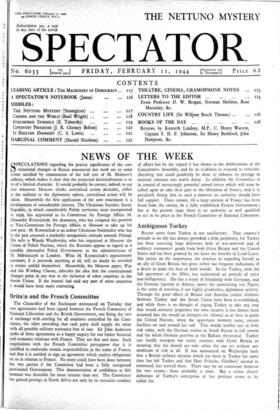Ambiguous Turkey
Recent news from Turkey is not satisfactory. That country's attitude as an ally has always provoked a little perplexity, for Turkey has been receiving large deliveries both of wat-material and of ordinary consumers' goods from both Great Britain and the United States and has been granted by the latter the benefits of Lend-Lease. She insists on the importance she attaches to regarding herself as an ally of Great Britain but gives rather too frequent indications of a desire to make the best of both worlds. So far Turkey, with the full agreement of the Allies, has maintained an attitude of strict non-belligerency. She has a treaty of friendship with Germany, and the German legation at Ankara, under the unwearying von Papen, is the scene of ceaseless, if not highly productive, diplomatic activity. Through the good offices of Britain and America cordial relations between Turkey and the Soviet Union have been re-established, and while there is no thought of urging Turkey to take any step that would seriously jeopardise her own security it has always been assumed that she would so interpret het alliance as at least to grant the United Nations, when the opportune moment came, certain facilities on and around her soil. That would involve her in little risk today, with the German armies in South Russia in full retreat and the whole German position in the Balkans threatened. Turkey can hardly interpret her treaty contract with Great Britain as meaning that she should act only when she can act without any modicum of risk at all. It was announced on Wednesday both that a British military mission which has been in Turkey for some time has left Turkey and that Herr Fritsche, Goebbels' second in command, has arrived there. There may be no connexion between the two events ; there probably is none. But a rather clearer definition of Turkey's conception of her position seems to be called for.


























